African Women Innovators Must “Ring the Alarm” on Change – Sarah Owusu
- bongiwe53
- Sep 30, 2025
- 8 min read
Updated: Oct 1, 2025
African women must claim their place as global innovators and lead bold responses to today’s unprecedented challenges, innovation consultant Sarah Owusu told the Rise & Shine Women in Media Breakfast Series, hosted by the fraymedia Foundation at the Johannesburg Country Club on Friday September 26, 2025.
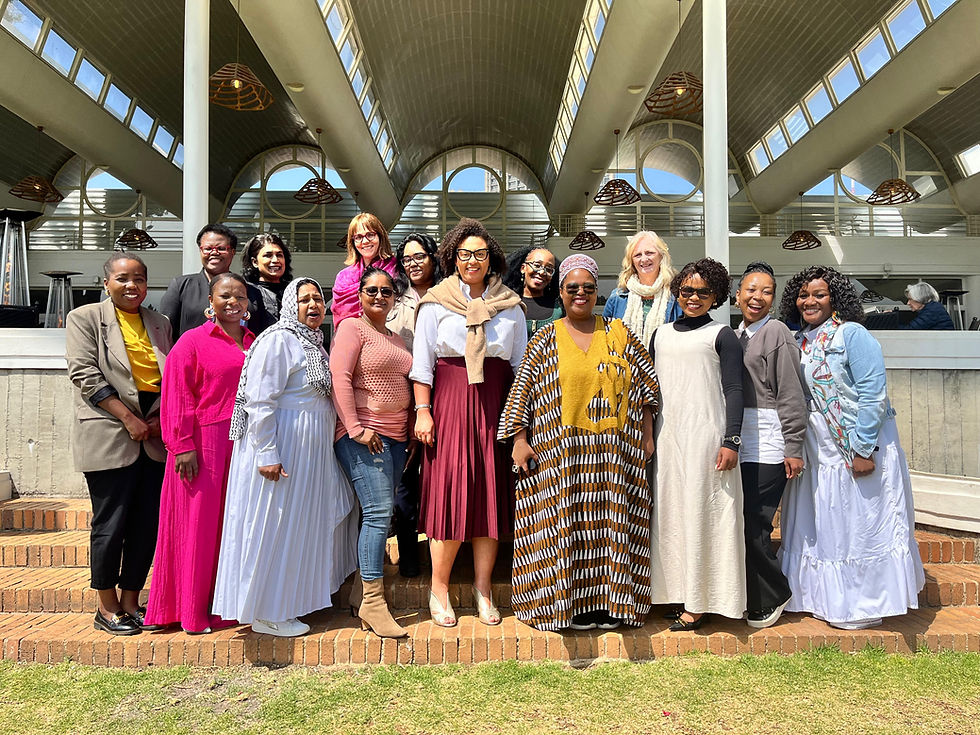
Owusu, co-founder of Mozambique-based consultancy InkDot, urged women entrepreneurs and media professionals to embrace imagination, community, and the courage to disrupt the status quo.
“If there’s one thing that you take away from this, it’s that the world needs to learn from us – not just from Africa, but from African women,” she said.
“We are already innovating. We do it every day, and we have something that the rest of the world hasn’t got right.”
Owusu, who describes herself as “a Danish Ghanaian born in Botswana” with a career spanning London, Mozambique and beyond, traced her journey from a reluctant freelancer to co-founder of a global innovation consultancy.
“I certainly started out as a freelance consultant with no intention of starting a business, and lots of commitment phobia around building a team,” she admitted. “It wasn’t until maybe three or four years later that I realised, firstly, I was exhausted, and secondly, I had big ambitions. If I wanted to build something that was going to have the impact I wanted, I needed others around me.”
Today, InkDot is a six-year-old firm of nine people working globally with clients ranging from technology companies such as Mozilla to major philanthropic organisations.
Navigating Unprecedented Times
Framing her keynote around “navigating complexity,” Owusu warned that societies face “times like we’ve never seen before,” shaped by climate crisis, fragile global systems, and exponential technologies such as AI.
“What got us here won’t get us there,” she said. “We’re going to need to get really radical. This isn’t just about incremental changes – it’s about finding completely new solutions.”
She likened innovation to responding to a fire alarm.
“Our first reaction might be panic. But the wisdom is: stay calm, look around you, find the safest way out, and leave behind what you don’t need. That’s the work of innovation too.”
Owusu said three practices can help women entrepreneurs and media leaders break free from the pull of the status quo:
• Imagination: “Right now, we’re living inside of a world imagined by others. If we don’t start imagining what we want, we will be given realities to live inside of.”
• Slowing down: “Times are urgent. We must slow down. Otherwise, we run super fast in the wrong direction.”
• Community: “What they [global powers] don’t have is community. What we have is the chance to build a really strong web of connected community that cannot be disrupted by anything.”
Innovation as a Collective Act
Owusu argued that Africans must resist the myth of separation and hyper-individualism, instead rooting innovation in shared realities.
“Innovation is not for the few, not for Silicon Valley, not for experts sitting halfway around the globe. Innovation is for everyone – and it’s the people closest to the challenges who know most about them.”
She closed with a call for courage and solidarity:
“We have to believe: I am of major impact. And at the same time, we must remember we can’t do this alone. None of this is faced on our own. We need each other.”
Sarah Owusu's full presentation is available here.
The fraymedia Foundation Rise & Shine Women in Media Breakfast Series connects women and leaders in media, advocacy and business and provides an opportunity for learning while networking with peers, potential mentors, funders and inspiring speakers who share relevant insights and experiences.
GALLERY: Rise & Shine Women in Media Breakfast Series with Sarah Owusu
Photos by: Rebaona Modutwane
Transcript with discussion: Sarah Owusu Rise & Shine Women in Media Breakfast Series – Johannesburg Country Club, 26 September 2025
Thank you so much, and thank you for having me. It’s wonderful to see you all.
I’ll try not to shout today, but to suggest. Please let me know if you can’t hear me — and feel free to interrupt me.
I had some slides prepared; you’ll get them afterwards. But before diving in, let me ground you a little in who I am.
I’ve just flown in from Denmark. I’m half Danish and half Ghanaian, born in Botswana, raised partly in Mozambique, and later studied in the UK. I worked in London for ten years until I’d had enough — enough of corporate life and the city — and I moved back to Mozambique to start as a freelancer.
At first, I never intended to build a business. I thought of myself as a consultant, working on my own. But a few years in, I realised two things: I was exhausted, and I had big ambitions. If I wanted to build something lasting and impactful, I couldn’t do it alone.
That shift led me to co-found Inc Dot with two partners. We’re now a team of nine, six years into the journey, working globally with clients like Mozilla and major philanthropic organisations. Sometimes I wonder why they choose a small consultancy from Mozambique — but they do. And that shows us something important: the world needs to learn from us, from Africa, and especially from African women.
How many of you here are freelancers? Entrepreneurs? Businesswomen? Say it with your chest!
I ask because I started as a freelancer with no intention of being a businesswoman. But over time, I realised growth meant building something bigger than myself.
At InkDot, we work in two main ways:
• Inside organisations — building culture, strategy, leadership, and mindset.
• Through transformative design — bringing diverse groups together to co-create solutions to complex challenges.
I also co-founded We Will Lead Africa, a storytelling platform that collects and publishes stories of everyday African leaders. We’ve produced six volumes so far, aiming for ten by 2027. Consider this an open invitation to contribute your stories.
One of our core beliefs at InkDot is that innovation is for everyone.
Too often, innovation is treated as the property of Silicon Valley or big tech. But innovation belongs to all of us. The people closest to the challenges are the ones who know them best.
That’s why I say: I’m here to ring the alarm.
Now, when we hear an alarm, our instinct is panic. But fire drills teach us differently: stay calm, look around, find the safest way forward, and leave behind what you don’t need.
That, too, is innovation. These times demand that we stay calm, let go of what no longer serves us, and move boldly towards what comes next.
We live in unprecedented times.
Covid showed how one small virus could disrupt global systems. Climate change is pushing us beyond planetary boundaries. AI promises solutions but can also accelerate our mistakes.
What got us here won’t get us there. Incremental change is no longer enough. We need radical new solutions.
So the question is not only what should we do, but who should we be?
For me, two qualities stand out:
• Great agency. As one Nigerian entrepreneur put it: “I am of major impact.” Each of us must believe our actions matter.
• Great humility. None of us can face these times alone. We need each other.
Despite the challenges, three practices can help us resist the pull of the status quo:
1. Imagination. We live inside worlds imagined by others. If we don’t imagine alternatives, we’ll inherit theirs. Innovation begins with daring to dream — and articulating those dreams so others can join us.
2. Slowing down. Philosopher Bayo Akomolafe says: “The times are urgent. We must slow down.” By slowing down, noticing, and being present, we create energy to move towards what we imagine.
3. Community. True innovation is rooted in connection. We must build strong webs of trust, locally and globally, showing up for each other even when it’s hard.
When people hear “innovation,” they expect shiny technology or exponential growth. But there’s another kind of innovation — slower, softer, more organic.
It’s the kind of innovation Africans, and especially African women, already practise: grounded in imagination, community, and presence.
So I invite you to think of yourselves as innovators — because you already are.
Take a deep breath. Trust your imagination. Build connections. And remember: you are of major impact.
Thank you.
Audience member: Sarah, this resonates deeply. We’re told constantly that crisis demands speed. But your reminder about slowing down, being present, and imaginative is powerful.
Sarah: Yes — and this connects to media. In today’s attention economy, we’re pressured to catch people’s eyes for a second. But the question is: can we hold their attention? And can we do it with integrity?
Audience member: AI is clearly transformative. But is it the technology that’s the problem, or the ownership of it? And do you see African-led innovation in this space?
Sarah: Both. Humans create tools, but tools also shape us. The technologies we’re building now change our brains, our environments, our relationships. It’s not just about how we use them; they are shaping us as we speak.
We must be alert to that.
On ownership: yes, we must own our platforms. One example is Masakhane, a community of African computer scientists and linguists building small, accurate language models for African languages. They’re ensuring our voices aren’t left out of the AI wave.
Audience member: It’s tough to build African platforms. We’re often forced onto American or European systems. But if we want to challenge the status quo, ownership must be a priority.
Sarah: Absolutely. And that’s why it’s harder to “do the right thing.” The system isn’t designed for alternative, independent platforms. But we can build, slowly and deliberately.
Audience member: What about relevance? How do we stay visible without chasing every new platform or technology?
Sarah: If your goal is to keep up, you’ll lose. The key word is discernment. Know your audience, know the challenge you’re solving, and focus. You don’t need every tool — you need the right one for your purpose.
Fear often drives us to chase everything. But we can’t innovate from fear. We must innovate from clarity and intention.
Audience member: Building community is hard, especially among women. There’s fear and mistrust.
Sarah: Yes, and that’s part of the status quo — it relies on us fighting for imagined scarcity. But there is enough. By creating spaces like this, we break that myth. We amplify each other’s voices, and that’s already radical work.
Audience member: I struggle with social media visibility. I resist posting constantly because it feels self-centred.
Sarah: That’s valid. Visibility isn’t only about social media. For us at Inc Dot, business growth comes through relationships and referrals. Sometimes the resistance is fear; sometimes it’s discernment. The key is to know which is which. You don’t have to play the visibility game everywhere. But wherever you do show up — bring all of yourself.
Audience member: I use different platforms differently. My public account is quiet, but my private Instagram became a space where women with hypothyroidism connected with me. It wasn’t planned — but it mattered.
Sarah: Exactly. Let the work speak. There’s no single formula. Visibility can mean being present in ways that feel authentic and aligned.
Charmeela Bhagowat: Thank you, Sarah. You’ve shown us that innovation today is about slowing down, using imagination, being intentional, and building community. That feels both radical and profoundly African.
Thank you, everyone, for joining us this morning. We’ll circulate Sarah’s presentation and look forward to seeing you at the next Rise & Shine Breakfast.

























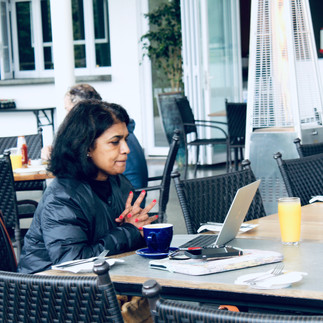



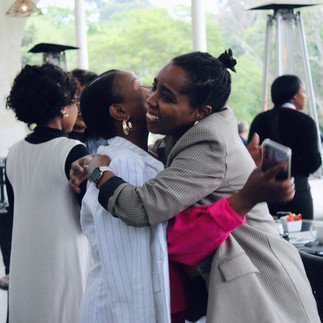













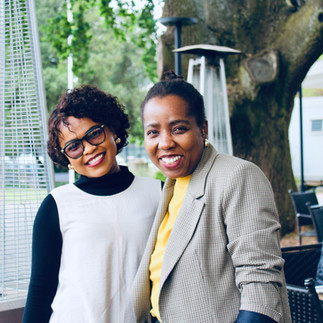





























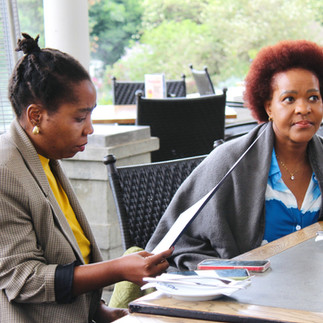























































































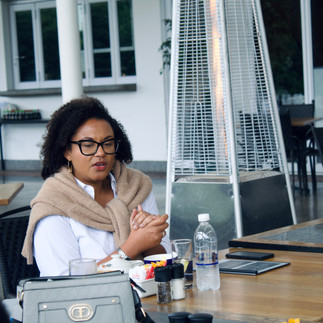











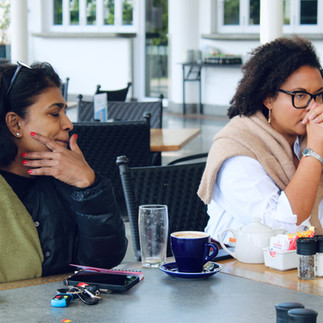













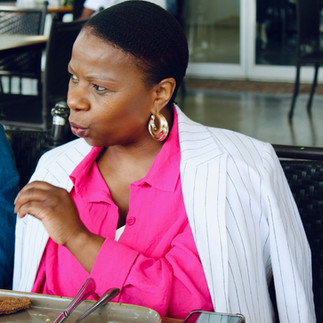

































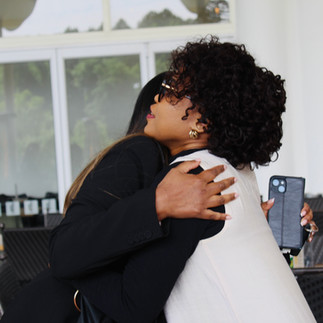



















































Comments